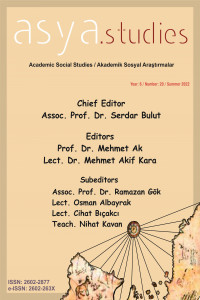METNİ ANLAMLANDIRMA SÜRECİNİN UNSURLARI: ANA FİKİR, YARDIMCI FİKİR, KONU
Bu araştırmada, Türkçe öğretmeni adaylarının metni anlamlandırma sürecinin unsurlarından olan ana fikir, yardımcı fikir ve konu kavramlarına ve bunların okuma sürecine etkisine ilişkin görüşlerinin betimlenmesi amaçlanmıştır. Nitel araştırma yönteminin durum çalışması deseniyle gerçekleştirilen araştırmanın çalışma grubunun belirlenmesinde amaçlı örnekleme yöntemlerinden kolay ulaşılabilir durum örneklemesi kullanılmıştır. Araştırmanın çalışma grubu, Recep Tayyip Erdoğan Üniversitesi Eğitim Fakültesi Türkçe Öğretmenliği Bölümünde öğrenim gören 43 öğretmen adayından oluşmaktadır. Araştırma verilerinin elde edilmesinde yarı yapılandırılmış görüşme formu kullanılmıştır. Veriler, betimsel analiz yöntemiyle değerlendirilmiş ve grafikler hâlinde sunulmuştur. Araştırma sonucunda ana fikri belirlemeyi öğrenme sürecinde öğretmenlerin aktif bir role sahip olduğu, bu beceriyi kazanma süreçlerinde ortaokul evresinin en önemli evre olduğu belirlenmiştir. Öğretmen adayları ana fikir ve konu kavramlarını ayırt etmekte zorlandıkları bu iki unsurun belirlenmesinde ise en çok metni okuduktan sonra otomatik olarak belirleme stratejisini kullandıkları tespit edilmiştir. Öğretmen adayları metnin ana fikrine rağmen yardımcı fikirlerini belirlemede daha yetkin olduklarını düşünmekte olup metnin yardımcı fikirlerini en çok metnin ana fikrinden hareketle belirleme stratejisini kullandıkları görülmüştür. Ana fikri belirlerken en çok şiir türünde zorlanan öğretmen adayları metnin konusu, ana fikri ve yardımcı fikrilerini belirleyebilmelerinin okuduğunu anlama becerilerinin yanı sıra okuma sürecinin duyuşsal değişkenleri olan okuma motivasyonu, okuma tutum ve okuma kaygılarını etkilediğini belirtmişlerdir.
Anahtar Kelimeler:
Ana Fikir, Yardımcı Fikir, Konu, Metin
ELEMENTS OF THE TEXT INTERPRETATION PROCESS: MAIN IDEA, SUPPORTING IDEA, TOPIC
This study aims to describe the views of pre-service Turkish teachers on the concepts of the topic, main idea, and supporting idea, which are the elements of the text interpretation process, and their effects on the reading process. Convenience sampling, one of the purposeful sampling methods, was used to determine the research study group. The study was carried out with the case study design, one of the qualitative research methods. The study group of the research consists of 43 pre-service teachers studying at the department of Turkish Language Teaching in the Faculty of Education at Recep Tayyip Erdoğan University. A semi-structured interview form was used to obtain the research data. The data were evaluated by the content analysis method and presented in graphics. As a result of the research, it was determined that teachers have an active role in the learning process to determine the main idea, and secondary school is the most critical stage in acquiring this skill. It has been determined that pre-service teachers have difficulties distinguishing the main idea and topic concepts, and they mostly use the strategy of automatically determining after reading the text while determining these two elements. On the other hand, pre-service teachers believe that they are more competent in determining the supporting ideas despite the main idea of the text. In addition, it has been seen that they mostly use the strategy of determining the supporting ideas of the text based on the main idea of the text. The pre-service teachers, who had the most difficulty in determining the main idea in the genre of poetry, stated that their ability to determine the topic, main idea, and supporting ideas of the text affected their reading comprehension skills, as well as their reading motivation, reading attitude and reading anxiety, which are affective variables of the reading process.
Keywords:
Main Idea, Supporting Idea, Topic, Text,
___
- Afflerbach, P. (1990). The influence of prior knowledge on expert readers’ main idea construction strategies. Reading Research Quarterly, 25, 31-46.
- Ahmadi, A. (2011). Comprehension of a non-text: the effect of the title and ambiguity tolerance. Pan-Pacific Association of Applied Linguistics 15(1), 163-176.
- Aktaş, Ş.; ve Gündüz, O. (2001). Yazılı ve sözlü anlatım. Ankara: Akçağ Yayıncılık.
- Akyol H. (2006). Türkçe öğretim yöntemleri. Ankara: Kök Yayıncılık.
- Alvermann, D. E. (2009). Sociocultural constructions of adolescence and young people’s literacies. L. Christenbury, R. Bomer ve P. Smagorinsky (Ed.), Handbook of adolescent literacy içinde (s. 14-28). New York, NY: Guilford.
- Arıcı, A. F. (2012). Okuma eğitimi. Ankara: Pegem Akademi.
- Aslan A. (2006). İlköğretim okulu 4. sınıf öğrencilerinin bilgilendirici metinleri anlama, özetleme ve hatırlama becerileri üzerinde zihin haritalarının etkisi (Yayımlanmamış yüksek lisans tezi). Gazi Üniversitesi.
- Ateş, S.; ve Akyol, H. (2013). Türkçe dersi öğrenme-öğretmen sürecinin anlama öğretimi açısından değerlendirilmesi. Türk Eğitim Bilimleri Dergisi, 11(3), 268-300. Ateş, S., Güray, E., Döğmeci, Y.; ve Gürsoy, F. F. (2016). Öğretmen ve öğrenci sorularının gerektirdikleri zihinsel süreçler açısından karşılaştırılması. Okuma Yazma Eğitimi Araştırmaları, 4(1), 1-13.
- Ateş, S.; ve Yıldırım, K. (2014). Sınıf öğretmenlerinin okuma becerisine yönelik uygulamaları: Strateji öğretimi ve anlama. İlköğretim Online, 13(1), 235-257.
- Başaran, M. (2006). Sınıf öğretmeni adaylarının ana fikir bulma yeterlilikleri. TSA/Yıl:10, S:1-2 Nisan-Ağustos. 2006.
- Başaran, M.; ve Akyol, H. (2009). Okuduğunu anlama ve metne karşı geliştirilen tutum üzerinde metnin bilgi verici veya hikâye edici olmasının etkisi. Uşak Üniversitesi Sosyal Bilimler Dergisi, 2(1), 11-23.
- Boudah, D. J. (2014). The main idea strategy: A strategy to improve reading comprehension through inferential thinking. Intervention in School and Clinic, 49(3), 148-155.
- Beishuizen J., Asucher J., Prinsen F.; & Mohr-Elshout M. (2003). (Abstract) Presence and place of main ideas and examples in study texts. British Journal Of Educational Psychology, 73.
- Brannan, B. (2010). A Writer’s Workshop, Kansas: McGraw-Hill
- ISSN: 2602-2877
- Yayın Aralığı: Yılda 4 Sayı
- Başlangıç: 2017
- Yayıncı: Mehmet Akif KARA
Sayıdaki Diğer Makaleler
Zeynep GÜMÜŞ DEMİR, Bahar AKOĞLU
ENDONEZYA’DAKİ VE TÜRKİYE’DEKİ UFRS UYGULAMASI: BİR LİTERATÜR İNCELEMESİ
Tuba DERYA BASKAN, Tri DAMAYANTİ
Onur ŞEYRANLIOĞLU, Alper KARAVARDAR
EĞİTİM MÜFETTİŞLERİNİN SORUNLARI
TÜRKÇE ÖĞRETMENİ ADAYLARININ OKUMA BECERİSİ STRATEJİLERİNİ KULLANIM SIKLIKLARININ BELİRLENMESİ
Süleyman AYDENİZ, Bünyamin SARIKAYA, Yunus ŞAKİROĞLU
CUMHURİYET DÖNEMİ TARİH DERS KİTAPLARINDA OSMANLI İMAJI (1950-2020)
MEDYADA SİYASİ AKTÖRLER VE SÜREÇLER: YENİDEN MİLLİ MÜCADELE DERGİSİNDE İRAN İÇ SİYASETİ
UZAKTAN EĞİTİM SÜRECİNDE İLKOKULLARDA SINIF YÖNETİMİ BECERİLERİNİN BELİRLENMESİ
